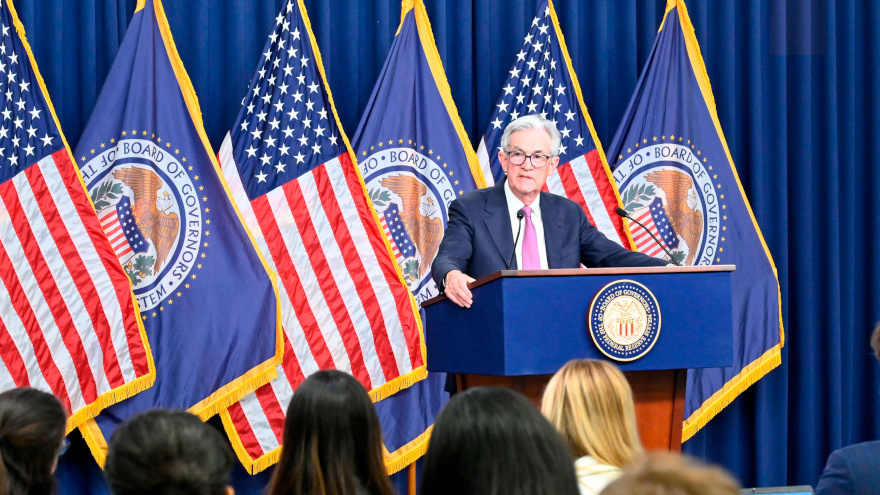Interest rates remain unchanged amid wide range of expert opinions & consumer sentiments

Federal Reserve chair Jerome Powell answers questions on Wednesday in Washington, D.C. Photo courtesy of the Fed.
By subscribing, you agree to receive communications from Auto Remarketing and our partners in accordance with our Privacy Policy. We may share your information with select partners and sponsors who may contact you about their products and services. You may unsubscribe at any time.
The Federal Reserve board kept interest rates unchanged on Wednesday, halting a streak of 10 consecutive increases when policymakers had the opportunity.
Cox Automotive chief economist Jonathan Smoke sees the Fed pushing rates higher again in July but doesn’t expect an official recession arriving this year.
But the latest TransUnion Consumer Pulse study found that 44% of Americans believe the U.S. economy is in a recession or will be by the end of June.
The position of Fed chair Jerome Powell?
“The economy is facing headwinds from tighter credit conditions for households and businesses, which are likely to weigh on economic activity, hiring, and inflation. The extent of these effects remains uncertain,” Powell said during a news conference on Wednesday.
“In light of how far we have come in tightening policy, the uncertain lags with which monetary policy affects the economy, and potential headwinds from credit tightening, the committee decided at today’s meeting to maintain the target range for the federal funds rate at 5 to 5-1/4 percent and to continue the process of significantly reducing our securities holdings,” he continued.
Subscribe to Auto Remarketing to stay informed and stay ahead.
By subscribing, you agree to receive communications from Auto Remarketing and our partners in accordance with our Privacy Policy. We may share your information with select partners and sponsors who may contact you about their products and services. You may unsubscribe at any time.
Cox Automotive previously detailed how much tightening has already happened in auto financing, coinciding with the Fed’s own survey of bank leaders about the likelihood those conditions.
After the Fed made its decision public on Wednesday, Smoke recapped the current state of auto financing.
Cox Automotive data indicated the average interest rate for new-vehicle financing booked so far in June stands at 8.9%, up 2.8 percentage points from a year ago. And for used-vehicle financing, Cox Automotive put the average rate so far in June at 13.6%, which is 3.3 percentage points higher from a year ago.
“The good news for consumers is that the rates on auto loans may not worsen despite the threat of another rate increase from the Fed,” Smoke wrote in his blog.
“One other factor will help consumers struggling with affordability in the used market: depreciation. Wholesale price declines have accelerated this spring, which should lead to lower retail prices this summer. As rates stop increasing and prices decrease, affordable used-vehicle payments will eventually come within reach,” Smoke continued.
“It is increasingly likely that we can avoid a recession this year, especially if the Fed has only one rate increase left. Consumer spending has remained robust to keep the economy growing. The vehicle market has had challenges with affordability, but if rates do not get worse, demand should stabilize and improve over the longer term,” Smoke went on to say.
For dealerships and finance companies looking to boost sales and originations, it might take some time if the latest TransUnion survey is any indication.
TransUnion reported three in four consumers (75%) believe a recession will occur by the end of 2023. Despite these concerns, about six in 10 Americans (57%) reported optimism about their household finances for the next 12 months – the highest level since the last quarter of 2021.
What’s driving these conflicting notions? TransUnion said it’s inflation.
According to the survey, about half (46%) of consumers reported their income is not keeping up with inflation for everyday goods such as groceries, gas and other household expenses. That’s understandable when one considers that inflation rose to 40-year high levels in mid-2022 and, despite a gradual decline over the past year, remains elevated at twice the rate it was prior to the pandemic.
The Q2 2023 Consumer Pulse study is based on a survey of 3,000 American adults between April 25 through May 9.
For the sixth consecutive quarter, consumers indicated that inflation is causing them the most anxiety, with 79% reporting it as one of their top three financial concerns. Recession (53%) and increased housing prices on rent or mortgage (45%) were the next highest concerns.
And while the Federal Reserve had increased interest rates 10 times since March 2022, TransUnion discovered rising interest rates (41%) only ranked as the fourth greatest financial concern for consumers, though that percentage did rise from 39% in Q1 2023 and 34% one year earlier in Q2 2022.
“We are living in uncharted territory from a consumer credit perspective,” said Charlie Wise, senior vice president and head of global research and consulting at TransUnion. “The combination of rising interest rates and elevated inflation, while not uncommon from a historical perspective, is an unfamiliar experience for many consumers, especially those in the Gen Z and millennial generations.
“It’s also likely why a number of people are expressing that they feel they are in a personal recession or soon will be in one, with costs rising faster than their incomes,” Wise continued in a news release. “Conversely, a majority of Americans are optimistic about their financial future. The No. 1 reason: the unemployment rate remains near record low levels. As long as the employment situation remains stable, most employed individuals have the resources to weather inflation and higher interest rates — at least in the near-term.”


